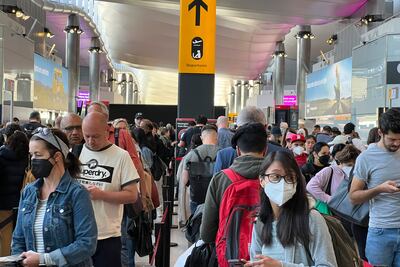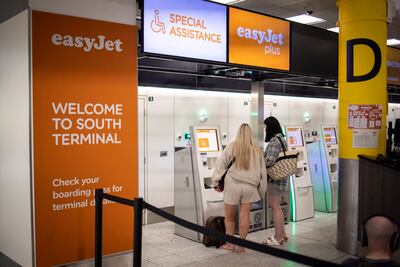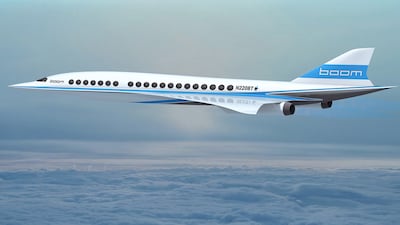Flying back from a weekend in Berlin, my flight was delayed because the incoming aircraft was late.
Then, when it did materialise, there was no ground staff available to bring and install the bridge. The passengers on board had to wait for about 40 minutes before they could disembark.
Eventually, we boarded an hour or so after we were meant to. We’d missed our slot for take-off so we had to sit on the tarmac for another 40 minutes until one became free.
Nobody regarded it as out of the ordinary; in fact, the delay was viewed as everyday, run-of-the-mill. Some people were agitated in case they missed connecting flights, but there was no anger. Everyone was accepting.
At home in London, I read that EasyJet is cancelling 1,700 flights from Gatwick this summer due to problems across Europe with air traffic control.
Meanwhile, US company Boom is pressing on with plans to reintroduce commercial supersonic travel. The venture’s Overture aircraft is intended to fly 65 to 80 passengers at Mach 1.7 or 1,300 miles per hour. That’s more than twice the typical top speed of a current long-haul airliner.
It’s incongruous that we can’t find someone to fit the bridge between plane and terminal, and we’re having to scrap services due to air traffic control pressures, yet others are forging ahead with making flying super fast.
Ever since Concorde was retired in 2003, in those intervening two decades air transport seems to have gone backwards not forwards.
The airport experience, by and large, is slow and unpleasant. The aircraft are usually crowded, cramped and often, dirty. Let’s not mention the food. The whole journey is best forgotten, as something to put up with, a necessary evil rather than a time to be enjoyed and savoured.
Intriguing then that Sir Richard Branson’s Virgin Group has shelved plans to buy a fleet of aircraft from Boom, and aero-engine manufacturer Rolls-Royce has withdrawn from the project, saying supersonic travel is no longer “a priority”.
In theory, you might have thought, it should be, that anything intended to speed up travel would be welcome. At last, we would be progressing, picking up where Concorde left off. We ought to be clamouring to halve flying times. Not necessarily so.
Concorde failed because of high fares, the amount of fuel it consumed and soaring maintenance costs. The craft might have been supersonic but it was still exposed to the slump in air travel following the 9/11 terrorist attacks.

Its cabin interior and cockpit were outdated, still based on design and technology from the mid-1970s, when the plane was introduced. Concorde was also incredibly and intrusively noisy – the bang of the sonic boom could be heard right across London.
It’s hard to know how much of that would alter with Boom. Obviously, Overture would be up to date, with cabin features and technical specifications far in advance of Concorde.
But it would still rely on elevated ticket prices, it would go through fuel, and without competition, parts would be costly.
And noise-wise it would be impossible to avoid – Boom would become a by-word for the aircraft.
Because of this, it may face being restricted to flying only over the sea – so London to UAE, London to Hong Kong, London to Sydney, these and many other possibly busy routes, that would be crying out for a supersonic service, they would be off-limits.
This is what the sceptics could see. Branson, too. When the Virgin founder steps back from a new, bold, ground-breaking venture, one intended to make a profit, you know it must bear a heap of issues.
Even if Boom takes off, and it is claiming the Overture will go into service in 2029, the firm will only service a relatively small number of travellers.
Currently, we enter a terminal and check in or if we’ve checked in already, drop our bags. Either way, we must prepare to queue. We participate in security systems that demand passengers remove their jackets and open their bags to retrieve laptops and liquids, only to repeat the procedure in reverse, once scanning is complete.
After that, having run the gauntlet of duty-free shopping, we must sit in the airport terminal. Unless we’re fortunate to be able to use an airline lounge, we must make do with functional seating and line up again to purchase food and drink.
Then, when the flight is called, we must head to the gate which is frequently far away. Once there, we sit again. Then we’re all herded aboard. If we’re lucky, we’re then racing down the runway and away.

All this usually takes two hours. Even if we’re going supersonic, it’s difficult to see how this process will be any different.
We will have reduced the flight time but not the waiting time at the beginning and end (I did not mention the delay while our bags are brought up and put on the conveyors, and the queue to get through the passport checks). And even a supersonic flight will be subject to the difficulties besetting air traffic control. It will also have to endure the effects of the industrial disputes that regularly trouble the air travel industry.
It does seem that our priorities are wrong. Given my Berlin trip and the news from EasyJet, all the money and creativity and engineering expertise going into developing supersonic flights for the lucky few would be better spent improving the lot for the unfortunate many.


